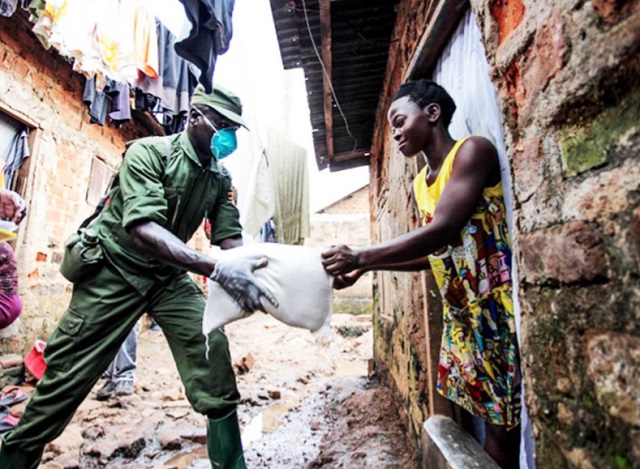
The truth about the COVID-19 food fights
Baca Juga

The comedy, corruption, and politics
Kampala, Uganda As the response to the Corona virus disease COVID-19 tests the leadership skills of heads of state and government across the world, President Yoweri Museveni has so far performed very well according to most observers who have spoken to The Independent.
While technocrats and political leaders have done the heavy lifting in the ministries of Health, Disaster, Security, Transport and more, Museveni’s routine addresses have offered critical information and reassurance, his show of empathy for the suffering population has been comforting and his firm guidance has offered hope. Museveni has exuded competence and many people like that.
“Mzee might be aging but he still has what it takes,” is how one person put it.
But it has not been smooth-flying all through. Many incidents have popped up to remind everyone that Corona virus or not, the country has a major activity looming on its horizon; the 2021 presidential, parliamentary, and local government elections.
The latest COVID-19 response activity to get clouded by the flavour of the 2021 general election posturing has been about food, specifically, the maneuvers over food by Museveni and other politicians struggling to emerge politically unscathed from the nationwide COVID-19 lockdown that has deprived millions of the means to earn a living.
Since President Museveni announced on March 30 that food distribution by individuals and organisations outside of the government was banned and set up a COVID-19 taskforce to specifically handle the food issue, he has acted tough. Only the government is allowed to distribute food to the needy. Museveni has also mobilised no less than 10 members of his cabinet to work on the food distribution issue. He has warned that anyone attempting to distribute food would be arrested and charged with attempted murder since food distribution causes crowds and crowding spreads COVID-19 which is a potential killer.
Museveni’s concern is believable from a health perspective. But cynics note that containing COVID-19 appears to have become a cover-all gagging tool for all political activity. It is the perfect pretext to block all political activity, leaving Museveni as the sole player. Many political commentators have said publicly that the President could easily, for example, postpone the next general elections slated for early 2021, just eight months away. Many politicians would want the 2021 elections postponed but several political strategists that The Independent spoke to say the President who is relishing his popularity and COVID-19 facilitated invincibility is unlikely to allow a postponement.
Food scarcity bites
Growing anger over food insecurity blamed on the COVID-19 nationwide lockdown could change that. Many people familiar with the logistical challenges of food distribution on a massive scale say the government will be overwhelmed, especially if recorded cases of positive COVID-19 infections rise, deaths occur, and the lockdown is extended beyond May 05.
The government does not have silos stocked with food anywhere in the country. Museveni is banking on buying the food and getting donations. So far many organisations have donated tonnes of maize meal. But the promised beans, milk, and even salt appear scarcer. When Museveni addressed the nation on April 19, he admitted the challenges of getting the right quantities and quality of food stuffs. He said salt imports from Kenya were faltering and advised people to get used to eating without salt.
A day before, the Minister of State for Disaster Preparedness, Musa Ecweru, had taken journalists on a reassurance tour of the emergency government food stores.
“We have enough food for the first phase,” Ecweru told journalists. The emphasis is on “first phase”. It is not clear what will happen after the first phase ends. For now, the government food support strategy appears to involve dividing the country into two; the urban poor who would get food aid and the rural poor who would be left to continue wallowing in subsistence sustenance.
Even when Parliament attempted to block food distribution in Kampala and Wakiso unless it was expanded nationwide, Museveni stormed ahead. The MPs argued that the lockdown has spawned food insecurity across the country and not only in Wakiso and Kampala.
“We have seen many such projects start and end in Kampala and Wakiso,” said Speaker of Parliament Rebecca Kadaga. In the end she appears to have cut a sweet-heart deal with Museveni that amounted to each MP getting Shs20 million COVID-19 support; to spend as they wished, possibly in their constituency.
The food scarcity situation is worsened by Museveni. He is not a believer in government handouts. His preferred intervention is to support enterprise through either government infrastructure or service support or provision of start-up capital. That is seen in the numerous poverty alleviation interventions the government has launched such as the Entandikwa loan schemes and the Bonna Bagagawale prosperity for all programmes. Distributing free food appears to go against Museveni’s beliefs.
The post The truth about the COVID-19 food fights appeared first on The Independent Uganda:.

0 Response to "The truth about the COVID-19 food fights"
Post a Comment